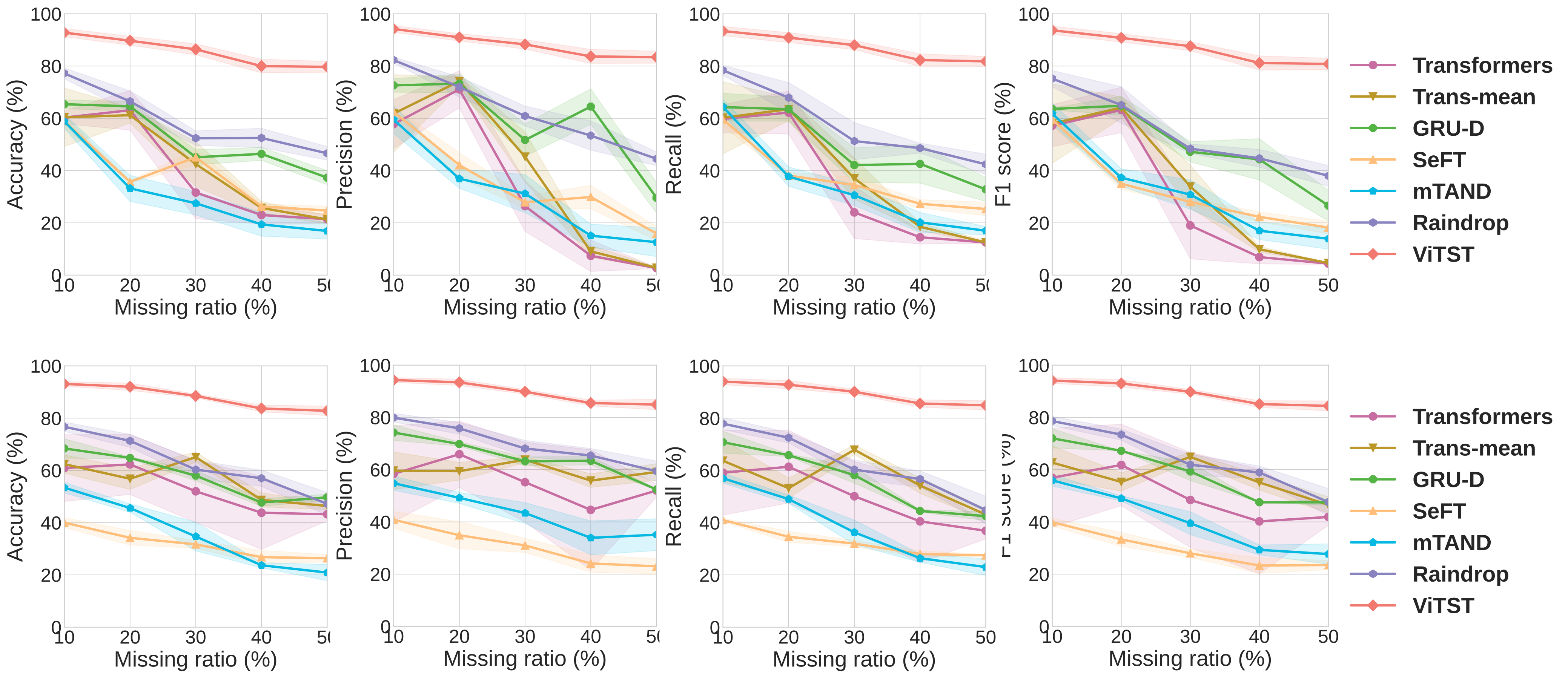This is an official implementation of the NeurIPS2023 paper: "Time Series as Images: Vision Transformer for Irregularly Sampled Time Series".
We consider the irregularly sampled multivariate time series modeling from a whole new perspective: transforming irregularly sampled time series into line graph images and adapting powerful vision transformers to perform time series classification in the same way as image classification. With a few lines of code to transform the time series into line graph images, any vision model can be used to handle any type of time series.
With such a simple idea, our approach significantly outperforms highly specialized SoTA algorithms:
| Methods | P19 | P12 | PAM | |||||
|---|---|---|---|---|---|---|---|---|
| AUROC | AUPRC | AUROC | AUPRC | Accuracy | Precision | Recall | F1 score | |
| Transformer | 80.7±3.8 | 42.7±7.7 | 83.3±0.7 | 47.9±3.6 | 83.5±1.5 | 84.8±1.5 | 86.0±1.2 | 85.0±1.3 |
| Trans-mean | 83.7±1.8 | 45.8±3.2 | 82.6±2.0 | 46.3±4.0 | 83.7±2.3 | 84.9±2.6 | 86.4±2.1 | 85.1±2.4 |
| GRU-D | 83.9±1.7 | 46.9±2.1 | 81.9±2.1 | 46.1±4.7 | 83.3±1.6 | 84.6±1.2 | 85.2±1.6 | 84.8±1.2 |
| SeFT | 81.2±2.3 | 41.9±3.1 | 73.9±2.5 | 31.1±4.1 | 67.1±2.2 | 70.0±2.4 | 68.2±1.5 | 68.5±1.8 |
| mTAND | 84.4±1.3 | 50.6±2.0 | 84.2±0.8 | 48.2±3.4 | 74.6±4.3 | 74.3±4.0 | 79.5±2.8 | 76.8±3.4 |
| IP-Net | 84.6±1.3 | 38.1±3.7 | 82.6±1.4 | 47.6±3.1 | 74.3±3.8 | 75.6±2.1 | 77.9±2.2 | 76.6±2.8 |
| DGM^2-O | 86.7±3.4 | 44.7±11.7 | 84.4±1.6 | 47.3±3.6 | 82.4±2.3 | 85.2±1.2 | 83.9±2.3 | 84.3±1.8 |
| MTGNN | 81.9±6.2 | 39.9±8.9 | 74.4±6.7 | 35.5±6.0 | 83.4±1.9 | 85.2±1.7 | 86.1±1.9 | 85.9±2.4 |
| Raindrop | 87.0±2.3 | 51.8±5.5 | 82.8±1.7 | 44.0±3.0 | 88.5±1.5 | 89.9±1.5 | 89.9±0.6 | 89.8±1.0 |
| ViTST | 89.2±2.0 | 53.1±3.4 | 85.1±0.8 | 51.1±4.1 | 95.8±1.3 | 96.2±1.3 | 96.1±1.1 | 96.5±1.2 |
In the rigorous leave-sensors-out setting where a portion of variables is omitted during testing, our method exhibits strong robustness against varying degrees of missing observations, achieving an impressive improvement over leading specialized baselines:

Figure: Performance in leave-fixed-sensors-out and leave-random-sensors-out settings on PAM dataset. The x-axis is the "missing ratio" which denotes the ratio of masked variables.
We conduct experiments on three irregular time series datasets P19, P12, and PAM, and several regular time series datasets from UEA & UCR Time Series Classification Repository.
We use the data processed by Raindrop.
The raw data can be found at:
(1) P19: https://physionet.org/content/challenge-2019/1.0.0/
(2) P12: https://physionet.org/content/challenge-2012/1.0.0/
(3) PAM: http://archive.ics.uci.edu/ml/datasets/pamap2+physical+activity+monitoring
The processed datasets can be obtained at:
(1) P19 (PhysioNet Sepsis Early Prediction Challenge 2019) https://doi.org/10.6084/m9.figshare.19514338.v1
(2) P12 (PhysioNet Mortality Prediction Challenge 2012) https://doi.org/10.6084/m9.figshare.19514341.v1
(3) PAM (PAMAP2 Physical Activity Monitoring) https://doi.org/10.6084/m9.figshare.19514347.v1
Follow these two steps to create the images for each dataset:
- Get the processed data, unzip them, and put the files in
datasetfolder. - Run the following commands in turn to create the images:
cd dataset/P12data/,python ConstructImage.pycd dataset/P19data/,python ConstructImage.pycd dataset/PAMdata/,python ConstructImage.py
We have also provided the created images at https://drive.google.com/drive/folders/1tBkEcU9vqjbLvRqfevkbQOw4-7XcURXE?usp=drive_link
Download the data, unzip the data, and put them in the corresponding directory.
For example, put all the directories obtained by unzipping the P12_images.zip under the ./datasets/P12data/processed_data/ directory.
You can download the datasets at http://www.timeseriesclassification.com/aeon-toolkit/Archives/Multivariate2018_ts.zip.
Create a folder Classification in the TSRAdara folder. Run ConstructDataset.py to create the images.
Before started, remember to insert your project directory into the system path by replacing the PROJECT_PATH in sys.path.insert(0, 'PROJECT_PATH/code') with your own project path.
For the dataset containing static features, such as P19 and P12, go to the code/Vision-Text/ folder and run the script vtcls_script.sh to start training:
cd code/Vision-Text/
sh vtcls_script.sh
For the other datasets, go to the code/Vision/ folder and run the script imgcls_script.sh to start training:
cd code/Vision/
sh imgcls_script.sh
We use the code provided by Raindrop. The code for the following baseline methods are placed in dataset/raindrop folder: Transformer, Trans-mean, GRU-D, SeFT and mTAND. See details of these baselines in our paper.
Starting from root directory dataset/raindrop, you can run models as follows:
- Raindrop
python Raindrop.py
- Transformer
cd baselines
python Transformer_baseline.py
- Trans-mean
cd baselines
python Transformer_baseline.py --imputation mean
- GRU-D
cd baselines
python GRU-D_baseline.py
- SeFT
cd baselines
python SEFT_baseline.py
- mTAND
cd baselines/mTAND
python mTAND_baseline.py
- IP-Net
cd baselines/IP_Net/src
python IP_Net_baseline.py
- MTGNN
cd baselines
python MTGNN_baseline.py
- DGM2-O
cd baselines
python DGM2_baseline.py
if you found this repo useful, please consider citing our paper:
@article{li2023time,
title={Time Series as Images: Vision Transformer for Irregularly Sampled Time Series},
author={Li, Zekun and Li, Shiyang and Yan, Xifeng},
journal={arXiv preprint arXiv:2303.12799},
year={2023}
}
